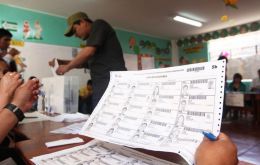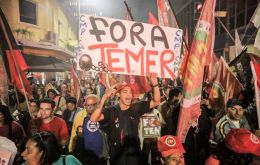MercoPress. South Atlantic News Agency
Tag: reform
-
Wednesday, December 16th 2020 - 08:57 UTC
New Chilean constitution will reserve 17 of 155 congressional seats for indigenous communities

Chilean lawmakers late on Tuesday approved a bill to reserve 17 of 155 seats for representatives of indigenous communities in its upcoming constitutional convention, a measure lauded as “historic” by the government of center-right President Sebastian Piñera.
-
Wednesday, October 23rd 2019 - 21:54 UTC
Uruguay Sunday’s general election: To a second ballotage and without parliamentary majority

On Sunday, October 27, in Uruguay, a new president, and Parliament will be elected. According to pollsters, the same parties as in 2014, the official Frente Amplio (FA, Broad Front) and the conservative National Party, will go on second ballotage in November. However, the novelty is that the Legislature will be made up of a minimum of six parties (a historical record) and a maximum of nine.
-
Tuesday, February 26th 2019 - 09:57 UTC
Cubans ratify new one-party socialist constitution with modest economic and social changes

Cubans have overwhelmingly ratified a new constitution that enshrines the one-party socialist system as irrevocable while instituting modest economic and social changes, according to the national electoral commission.
-
Tuesday, December 11th 2018 - 08:24 UTC
OAS Mission congratulates Peruvians for the peaceful Sunday vote

The Electoral Experts Mission of the Organization of American States (OAS) congratulated Peruvian citizens for a peaceful vote in which they expressed their will in a decisive way. The Mission also congratulated electoral authorities on their ability to organize in a short-term the national referendum on December 9.
-
Friday, January 12th 2018 - 10:58 UTC
S&P downgrades Brazil's credit rating; delay of pension system reform takes the blame

Ratings agency Standard & Poor’s cut Brazil’s credit rating further below investment grade on Thursday as doubts grew about a presidential election in October and a push to trim its costly pension system, seen as vital to closing a huge fiscal deficit. S&P lowered its long-term rating for Brazil sovereign debt to BB- from BB previously, with a stable outlook, citing less timely and effective policymaking. S&P also cited a risk of greater policy uncertainty after this year’s elections.
-
Friday, December 22nd 2017 - 09:56 UTC
Argentina: Approval of reform bills triggers markets

Merval, the main index of the Buenos Aires Stock Exchange, rose 1.51% Thursday, closing at 28,494.01 points - close to exceeding the maximum of the year, by 28,500 points. The Argentine stocks were driven by the approval of the pension and tax reforms passed this week in the House of Representatives.
-
Tuesday, May 25th 2010 - 00:57 UTC
IMF bluntly tells Spain austerity and reform measures are not enough

The International Monetary Fund has raised fresh concerns about Spain's economy, saying “far-reaching” reforms are needed to ensure its recovery. It said the country faced “severe” challenges, including the need to urgently reform a “dysfunctional” labour market, and its banking sector.
-
Wednesday, May 5th 2010 - 01:27 UTC
Cuba Fires Ministers, Considers Opening Sugar Industry to Foreign Investors

Cuban President Raúl Castro replaced two high-level government ministers citing errors and incompetence, in the latest round of replacements at top-level government posts. There are also signs that Cuba might turn the sugar industry to foreign investment.
